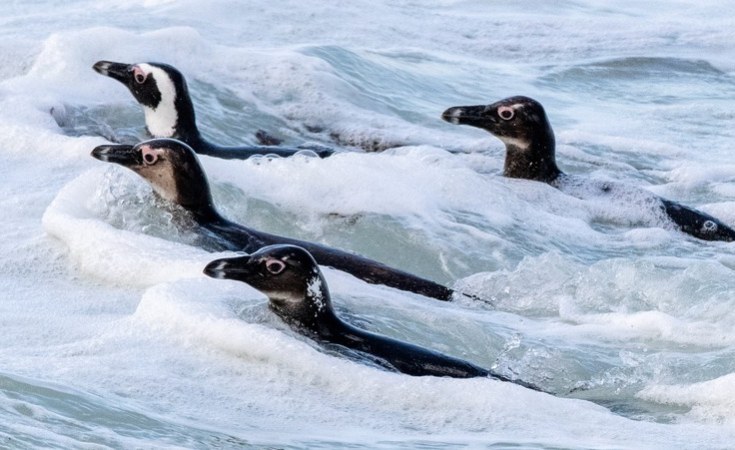Activists say that the litigation to protect the birds' feeding grounds has been dragged out for months by the state, despite the urgency of the situation
- Conservation organisations are challenging the government's partial implementation of expert recommendations to protect the critically endangered African Penguin.
- The legal battle is over the location and size of "no take" fishing zones around penguin breeding sites.
- The conservationists say the minister for fisheries and the environment Dion George has repeatedly missed court-mandated deadlines and they are calling for punitive costs.
- The delays, they say, have caused "incalculable prejudice" for the birds' survival.
The government's "exceedingly late" filing of answering affidavits in a court challenge to its management of the African Penguin has caused "incalculable prejudice" to the seabird species that has just been classified as "critically endangered".
The delay has been so severe that the court should impose costs on a punitive scale against state respondents - the Minister of Forestry, Fisheries and the Environment Dion George and two senior officials in his department - to indicate its displeasure.
This is argued in a replying affidavit by BirdLife South Africa, which together with the Southern African Foundation for the Conservation of Coastal Birds (SANCCOB), is bringing a review application in the high court in Pretoria.
The two groups are challenging the rationality and legality of a decision by George's predecessor, Barbara Creecy, to only partially implement the recommendations of an international panel of experts that she appointed to help break deadlock over competition between penguins and commercial fishers.
Small-pelagic fish stocks (pilchards and anchovy) are a vital food source for the rapidly declining penguin population but are also targeted by the commercial purse seine fishing industry.
The dispute centres on the panel's recommendations for where and how "no take" fishing zones should be established around penguin breeding sites - mainly islands - to boost the birds' chances of survival.
George, two of his deputy directors-general and two fishing groups - the South African Pelagic Fishing Industry Association and the Eastern Cape Pelagic Association - are respondents in the case that was scheduled to be heard in late October, but has been postponed to March next year.
Delays
The first papers by the applicants were served on 20 March 2024, but the legal process was delayed from the outset by the failure of the department (DFFE) to timeously provide the applicants with a full record as required by the Uniform Rules of Court.
A case management and procedural timetable directive was then issued by Deputy Judge President (DJP) Aubrey Ledwaba in terms of which answering affidavits by George and his officials were to be delivered to the Registrar by 26 July and from the fishing industry respondents by 5 August.
Replying affidavits by the applicants were to be filed by 23 August.
However, further delays led to a second case management meeting on 19 August, where the DJP agreed to an amended procedural timetable giving the state more time.
Then, according to a replying affidavit by Dr Alistair McInnes, Seabird Conservation Manager at BirdLife SA, the applicants were surprised on 20 August to see posts by the Democratic Alliance (DA) on various social media platforms headlined "Lifeline for African Penguins as Minister protects feeding grounds" (George is a DA appointee).
On 21 August, the State Attorney delivered a "without prejudice" letter from George to the applicants and to the fishing industry respondents, inviting them to a meeting to explore a possible out-of-court settlement and proposing the establishment of a working group to resolve, alternatively to suspend, the litigation.
However, the parties were unable to find a mutually acceptable date and no meeting took place.
McInnes said there was a further surprise when the state delivered its answering affidavit on 19 September, "well outside" the three-week extension that had been requested from the DJP and some six months after the launch of the application.
"Such conduct demonstrates flagrant disregard for the rules of court, the DJP's directive and falls far short of the standard expected of state litigants," McInnes stated in his affidavit.
This late filing had necessitated a third case management meeting on 14 October, after which Judge Mngqibisa-Thusi had issued a further amended directive for a new procedural timetable and hearing dates.
While the applicants did not oppose the state's application for condonation of the late filing of its answering papers, the state had not made out a deserving case and its delays had resulted in "severe consequences", stated McInnes.
"All the parties in this matter acknowledge the extremely perilous situation facing the African Penguin. In spite hereof, the state filed its answering affidavit months after it was required to do so. This, in circumstances where the very purpose behind this application is to urgently address the imminent extinction of the African Penguin.
"The state's conduct in delaying filing its answer, and then putting up a hollow explanation for this delay, ought not to be countenanced. Not only has it failed to make out an adequate case for condonation, but its conduct in flagrantly disregarding timelines set by the Deputy Judge President during the case management process ... is deserving of an adverse, if not punitive, cost order."


